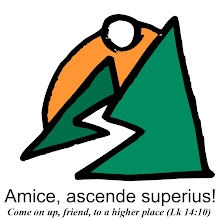
18th Sunday in Ordinary Time (B)
August 2, 2009
The Israelites who wandered in the desert did not just have wants. They whined, wailed and grumbled against Moses and Aaron, even as they pined for what they sorely missed back “home” in Egypt – decent food, real food … along with familiar relative creature comforts. Never mind that they were slaves … put aside the fact that they were not free … forever doing work that bore no lasting fruit for them and the whole community then in bitter exile.
But today’s liturgy seals for posterity the truth about God and His loving intervention on His people’s welfare: “The Lord gave them bread from heaven,” (Psalm 78:24) as our enthusiastic response to the first reading puts it… not just material bread, assuredly … not just “food that perishes,” but “food that endures for eternal life.” (cf Jn 6:27)
How myopic and shallow we modern “Israelites” could be! We are being led by the Lord towards fullness of life and here we are complaining about what we think is a raw deal we are getting! Like the Israelites of old, we cannot stand being out there in the desert of long-haul commitment of hope and self-denial, and we pine for the short-term, though illusory, solutions provided by a world mired in a culture of instant, easy, but shallow answers to the deepest questions and desires that go beyond our want for mere material bread.
We all, young and old alike, are now captivated by the “ningning” (glitter) of superficial solutions to our wants and problems that come from a seeping culture of shallow consumerism, espoused by the rapidly shrinking globalized and media-controlled world of malls, “eatertainment” and “retailtainment” centers, awash in escapist telenovelas, chinovelas and anime presentations.
The world offers us bread – and not much else besides and beyond!
But the world – and that means each one of us – wants and needs more than just bread. We are in search for something more, something deeper, something nobler and greater – an authentic and all encompassing desire that stands behind all our little wants and needs. This is something which the world and all it offers, cannot give, notwithstanding its “ningning” and, at times, even overwhelming power to attract us.
For deep beneath the surface reality of our inauthentic desires, lie our deepest wantings and yearnings for God, for fullness of life, for meaning and for union and oneness with our Creator. We long for bread. But we want more than just manna. And the Lord gives us more than just bread. “Amen, amen, I say to you, it was not Moses who gave the bread from heaven; my Father gives you the true bread fro heaven. For the bread of God is that which comes down from heaven and gives life to the world.” (Jn 6:32-33)
It is time we acknowledged to ourselves and to God the reality of our deepest wanting. God is never far from our deepest desires. God can never be far from what He Himself has implanted deep in our nature as relational beings. God is there, where all the action in our life is – in the source of our deepest wanting. It is time we set aside the inauthentic, “deceitful desires” (Eph 4:22) that have corrupted us, and get to the task at hand: to “be renewed in the spirit of [our] minds, and put on the new self, created in God’s way of righteousness and holiness of truth.” (Eph 4:24)




